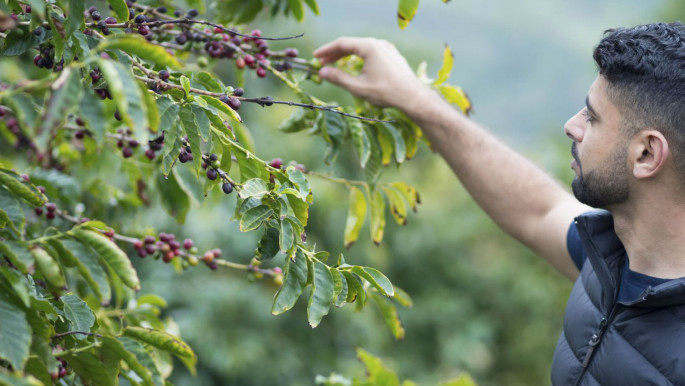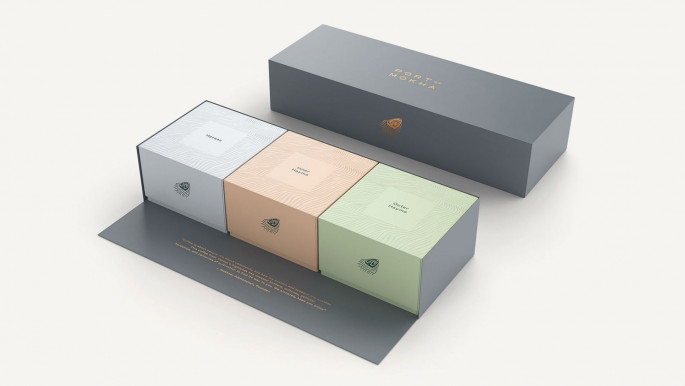How 'Port of Mokha' founder reclaimed coffee for Yemen's farmers
The scene of the world’s worst humanitarian crisis once hosted the world’s most important and vibrant coffee trade, providing a source of income and livelihood to thousands of active farmers nationwide.
Unbeknownst to most, Yemen - though now instantaneously connected with war, conflict and terror - is the land where the global love of coffee is thought to have started, and as the story goes, by a man named Shaykh Ali Ibn Omar Alqurashi al-Shadhili, commonly dubbed the ‘Monk of Mokha’ after being the first to brew coffee.
Coffee cultivation began in 15th century Yemen, legend suggests, to tend to the needs of local Sufi sheikhs searching for ways to stay awake throughout the night to partake in prayers, before eventually spreading across the Arabian peninsula and later to other parts of the world via the port of Mokha.
While the number of corporate and independent coffee shops continue to spawn at an astounding rate across the globe, Yemen’s coffee farmers have remained somewhat excluded and production flatlined throughout the years.
In 1875, Yemen was producing more than 60,000 tonnes of coffee but the figure has dramatically decreased over the last 150 years to less than just 15,000 tonnes.
Unlike the former ruling imam at the time who acknowledged the power of coffee, Yemen’s recent governments showed little interest in the magical beans. Instead, the Yemeni state has focused on rival crops, including the natural stimulant Qat - which has for years dominated the country’s agriculture with seven Qat plantations existing for each coffee plantation.
In 2014 an American of Yemeni origins walked by a statue honouring a Yemeni Sufi scholar in the US state of San Francisco thousands of miles away and was instantly inspired by his tale.
Mokhtar al-Khanshali who by his own accord suggests “didn’t even drink coffee” was immediately taken back to the days he helped his grandmother pick coffee cherries on a plantation in Ibb, Yemen.
 |
| Mokhtar "did not even drink coffee" before delving into the trade [Port of Mokha] |
“Something clicked in my head,” the Founder of Port of Mokha Coffee told The New Arab. “When I was younger I would hear stories of the port of Mokha and our heritage as Yemenis, so I started researching more about coffee.”
Inspired, Mokhtar then walked into a coffee shop one day and ordered a coffee from Ethiopia which blew him away. “The taste of blueberries - juicy, silky, honey - I didn’t know coffee could taste like that. Usually the coffee we’re used to is very dark and over-roasted and you have to put sugar to make it drinkable - from then I became obsessed with coffee.”
Five months later and after becoming the first Arab to pass a 22-part exam administered by the coffee quality institute Q-Grader, Mokhtar was on a mountain top in Yemen and just months away from the adventure of a lifetime.
“That summer I started by going to 32 different regions, from Saada to Hajja and Maweet, Bani Matar, Yafea. I just learned everything I could about coffee in that time.”
Up until that point, Mokhtar’s knowledge of coffee production was admittedly extremely limited and so the young, budding entrepreneur relied heavily on locals to guide him on the journey to retrieving coffee.
“It was actually quite funny, I went to this village and I stood looking at this random tree for a few minutes before a coffee farmer called Mohammed came up to me and said, ‘I’m sorry Mokhtar but I just wanted to tell you that the coffee trees are actually over there,” Mokhtar jokes. “Now I teach courses on coffee genetics and processing techniques...five or six years ago I didn't drink coffee.”
While the new-coffee enthusiast delved deeper into harvest patterns, elevations, and type of coffees, Mokhtar was able to hear the stories of farmers and gained a better understanding of the issues and problems they face on a daily basis.
“I would go to villages and they would have people lined up and have a lottery system to see who would host me. The amount of generosity they showed was incredible - and if you tried to pay them it would be a huge sign of disrespect.”
 |
In the first year we paid for six weddings, some medical surgeries and tuitions, and they paid us back in coffee cherries. |  |
For Mokhtar, returning that respect to the local farmers became an integral part of the company’s mission. Just months into the journey, Mokhtar was able to create a social impact programme called the Mokha method, designed to financially assist the farmers through micro-loans while honing their skills in cultivating coffee.
“These farmers were in these vicious cycles with loan sharks. In the first year we paid for six weddings, some medical surgeries and tuitions, and they paid us back in coffee cherries.
“The second thing we focused on was women. In the villages women have a lot more agency, it’s more of a matriarchal society and they own much of the land. They're not limited like in the cities where there is a lot of Saudi influence.”
“We organised cooperatives and mandated that half of members have to be women in villages and the quality of the coffee changed overnight. We also pay the farmers the highest price for coffee in the world," he proudly added.
But while Mokhtar focused on his newly-established company, tension was brewing elsewhere in the country.
On September 2014, Yemen’s Houthi rebels allied with former rival Ali Abdullah Saleh - the country’s first and longest serving president who was overthrown in the region-wide wave of protests during the 2011 Arab Spring.
Under the cover of the night, the alliance crept into and overran Sanaa and later marched into other major cities across the impoverished state, forcing the government of Abedrabbo Mansour Hadi to flee to the the southern coastal city of Aden where a temporary capital was set up.
“That night I was shocked. All I could think about was what was going to happen and how we would continue as a country,” Mokhtar remembered.
“Houthis began propping up checkpoints using child soldiers. It was actually really awkward seeing a military checkpoint from the Yemeni military command then seeing a Houthi one next to it.”
 |
Two of the samples surpassed expectations and were rated over 90 - making them the best quality, and most expensive coffee beans in the world. |  |
In March of the following year, and just a day before Mokhtar was due to leave for a conference in Seattle, Saudi Arabia mobilised a coalition to battle the rebels and reinstate the internationally recognised Hadi government in what would soon become a controversial and highly-criticised war leaving more than 10,000 dead.
“A night before I was supposed to leave to go to this conference I woke up in the middle of the night and heard explosions around me and what looked like laser beams being shot into the sky - they were anti-aircraft machine guns being shot at Saudi jets, thats when it began.”
The coalition’s relentless bombing campaign destroyed numerous targets, including government buildings, Houthi camps and the city’s only airport. Trapped in an unexpected war, the US citizen attempted to seek refuge with the American embassy in Sanaa but was turned down.
In the midst of the chaos, a friend told Mokhtar of a Greek ship due to leave the port of Aden. Desperate for an escape, Mokhtar travelled by car for nearly 7 hours to the southern city to catch the ship but was detained by local Adenis suspecting him of being a Houthi rebel.
After intense negotiations and help from a friend in Aden, Mokhtar was released and quickly arranged another escape through the port of Mokha, in a journey that would later become the logo to his company.
“I went to Mokha and took a little boat with my coffee samples and crossed the red sea to Djibouti. From there I went to Kenya, Amsterdam then landed in San Francisco to cameras and journalists interested in my journey.
“In fact, I was in the Uber going to the conference the next day and I could hear myself on BBC Radio, and the driver was commenting about how crazy this story was, and I said ‘yeah he’s nuts’”, he laughed.
After the treacherous journey home, Mokhtar returned to the US with 21 different coffee samples from regions across Yemen. While 19 failed basic standards, two of the samples surpassed expectations and were rated over 90 - making them the best quality, and most expensive coffee beans in the world.
“When we do coffee tastings, its blind. Nobody knows whose coffee belongs to who. I wanted people to respect the farmers, its not just about this adventure story.”
Four years on, Mokhtar’s coffee beans are now being sold on a global scale, supplying cafes in New York, Paris and places as far as Tokyo, in beautiful, luxurious boxes stamped with the The Port of Mokha logo - a man in a small boat with packages. Inside, three smaller colourful boxes are neatly placed side by side, donning the names of the lands where the beans were cultivated.
 |
| Mokhtar's coffee beans are among the most expensive in the world [Port of Mokha] |
But as the final layer reveals itself, Mokhtar’s vision to elevate and praise the farmers of Yemen finally comes to life with the names of individual farmers who produced the beans, including Ali, Fatima and Shayba among thousands of others.
“The idea that they've produced this with their own hands, their hard work and sweat and they're proud of what they produce, they're proud of who they see in the mirror. This idea that is building the country’s self-confidence.
“When I go to these hipster shops in Brooklyn, or in Tokyo or in Paris, people who don't know much about Yemen are now interacting with it through a medium different to the news. Coffee is a way to build bridges.”
Nearly three years into the deadly war in Yemen, more than 10,000 have been killed, millions more are food insecure and country is grappling with a deadly cholera outbreak. The Saudi-led bombing campaign, designed to retrieve the reigns from the rebels, has done little to reinstate the internationally recognised government, and restrictions on all ports has further risked the lives of millions in the regions poorest nation.
“Trying to build and sustain a company in the middle of war has been struggle. It’s expensive and difficult to figure out a passage for our coffee to exit the country.
“Coffee is the second most consumed beverage, after water, in the world. Coffee lovers need to know that if it wasn’t for Mokha or these people, you would not be drinking this coffee. That is why we need to pay homage to these people, and if you have enough in your heart, rally your local government to stop selling arms to countries bombing Yemen,” Mokhtar poignantly notes.
But the action doesn’t stop here for the former activist and paralegal who intends to set up a non-profit organisation designed to create ways to impact people in Yemen and create longer developments for the war-torn country.
While the ‘Mokha Foundation’ is due to be announced this year, Mokhtar’s story, which was closely and personally followed by the award-winning author Dave Eggers, is due to be published in a much-anticipated book dubbed ‘The Monk of Mokha’ on January 30.
Follow Sana Uqba on Twitter: @Sanasiino





 Follow the Middle East's top stories in English at The New Arab on Google News
Follow the Middle East's top stories in English at The New Arab on Google News


